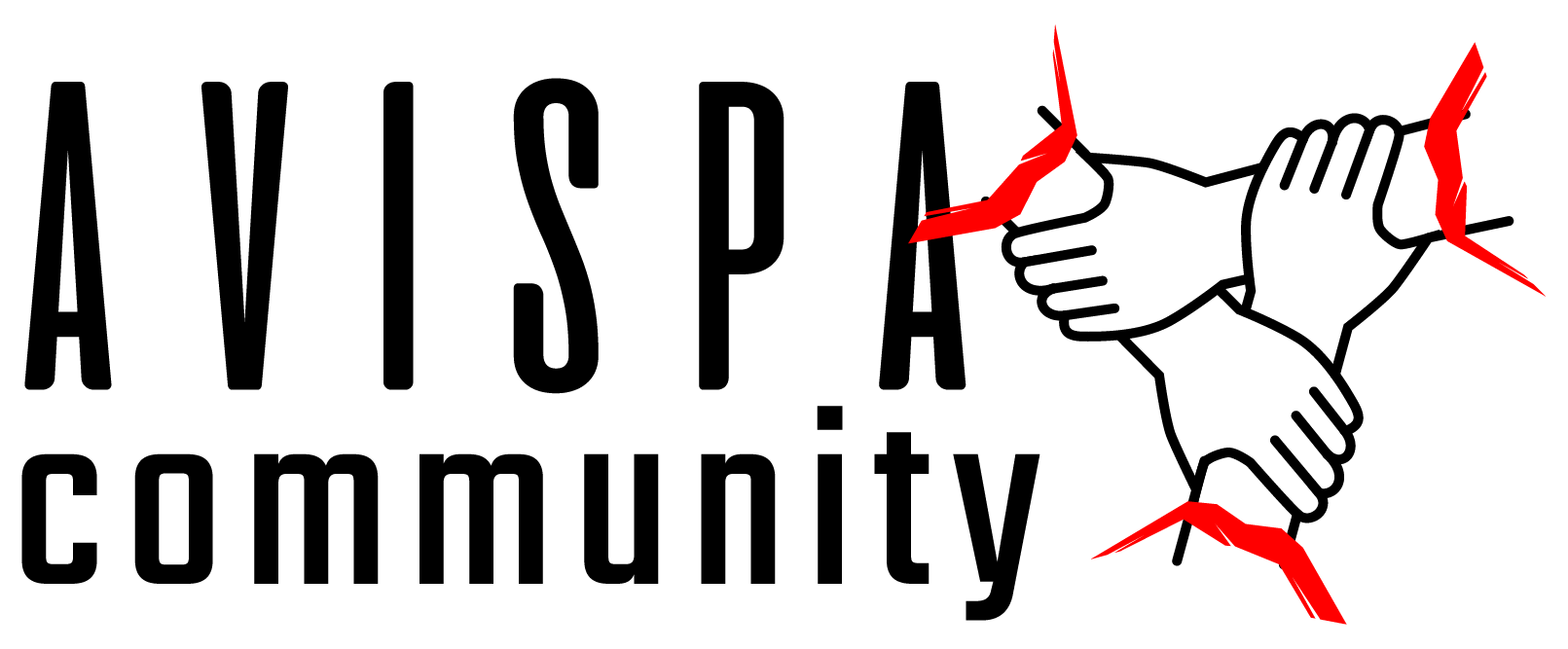On Wednesday, June 19, the Supreme Court of Justice of the Nation will rule on the amparo in the case of Miguel Peralta, community organizer and ex-political prisoner from the community of Eloxochitlán de Flores Magón, Oaxaca. The Supreme Court will decide whether or not to put a definite end to the nearly ten years of political imprisonment and persecution faced by Miguel Peralta.
Miguel is one of 35 members of the community assembly of Eloxochitlán de Flores Magón criminalized in case number 02/2015, following a socio-political conflict in December 2014. The conflict was a consequence of mounting tension between the community assembly and the interests of a cacique group, backed by political party power, who’ve sought to maintain control of the municipal government, municipal funds, and the exploitation of natural resources in the community.
On December 14, 2014, the assembly was violently attacked by the cacique group led by Manuel Zepeda Cortés as they gathered in the town plaza to elect a community authority. The ensuing violence left two dead, including the son of Manuel Zepeda. Zepeda’s daughter, Elisa Zepeda Lagunas, would lead the criminalization efforts, fabricating crimes and using positions of political power in the municipal and then state government to influence the legal processes.
Miguel Peralta was arrested in April 2015 on charges related to the events on December 14. Over two years later, on October 26, 2018, he was sentenced to fifty years in prison for homicide and attempted homicide. Following an appeal from his legal team, his fifty-year sentence was absolved and his case returned to the final hearing, for the fact that he was denied his right to be at his first final hearing. Prison authorities had used the excuse that they didn't have gas money to transport him from prison in Cuicatlán to the court in Huautla de Jiménez, Oaxaca. In October 2019, he was acquitted of the charges and released after spending almost 4.5 years in prison.
You might be interested in- Court Order Threatens Freedom of Former Mazatec Political Prisoner
Following an appeal from the accusing party, on March 4, 2022, the fifty-year sentence was reaffirmed and a warrant put out for his arrest after less than two years of freedom. Following an appeal to that decision, the collegiate court in Oaxaca returned his legal process back eight years, to the testimony stage, seeking again for Miguel to face this process from inside prison. In the face of this decision, his legal team filed a request to the Supreme Court of the Nation for a review. Miguel Peralta is currently free, but with a warrant out for his arrest.
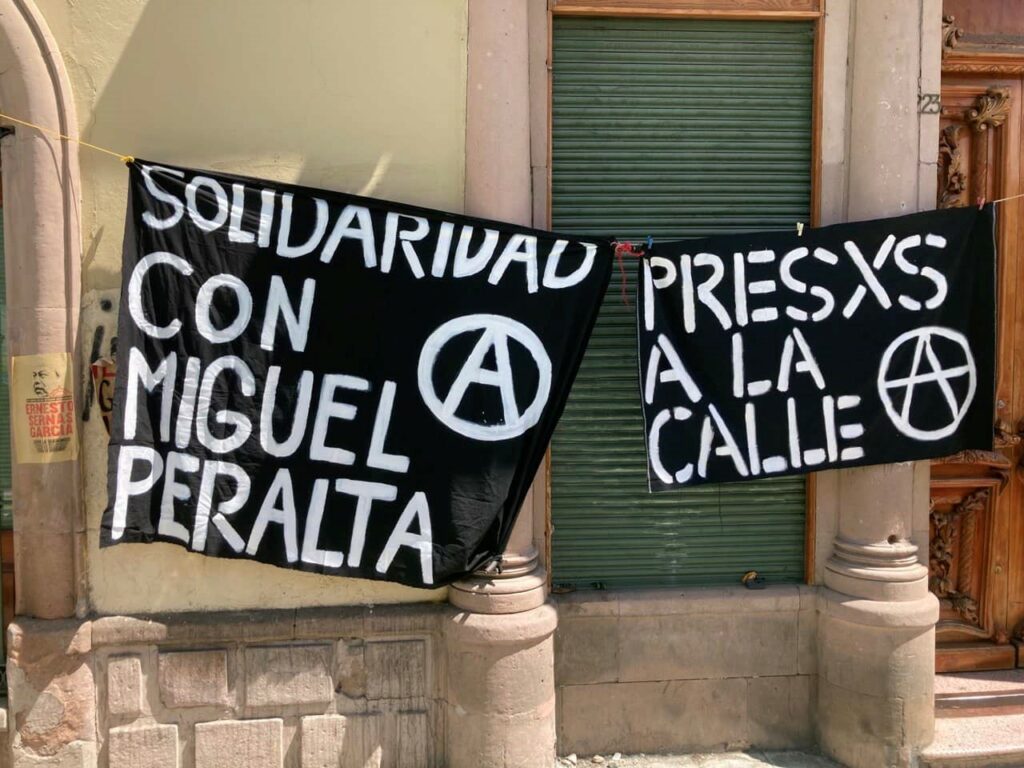
Photo: Anti-prison activity in Oaxaca in January 2023
All Eyes on the Supreme Court
In January 2024, the Supreme Court of the Nation took up the amparo with case number 6535/2023. And on June 19, they will discuss and release their decision. The lead opinion has been presented by Justice Loretta Ortiz Ahlf. The other justices—Juan Luis González Alcántara Carrancá, Jorge Mario Pardo Rebolledo, Ana Margarita Ríos Farjat, and Alfredo Gutiérrez Ortiz Mena—will debate that opinion on June 19. The final decision must be made by a majority of the five justices.
“The court has a historic opportunity” explained Miguel Peralta’s lawyer, Araceli Olivos, in a press conference in Mexico City. The court has the opportunity to set a different precedent in the relation between Indigenous peoples and the Mexican state; a relation that has historically been stained by oppression, exploitation, discrimination, and marginalization against Indigenous peoples. With this decision, the court has the opportunity to begin undoing these historical wrongs perpetrated against Indigenous peoples.
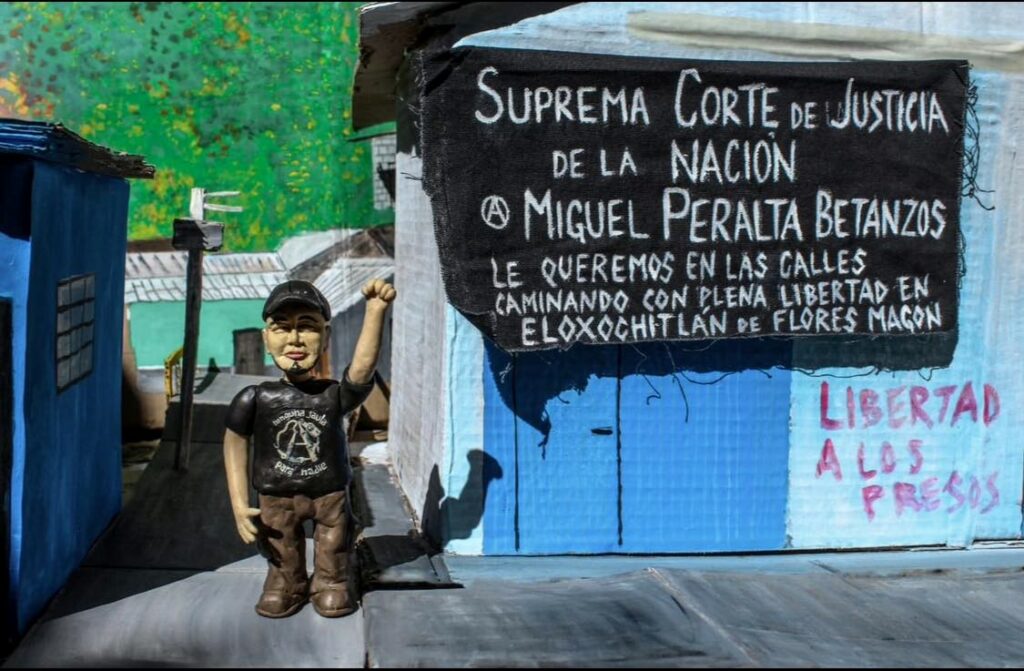
Photo: Resistance art made of plasticine and other materials created by Valentin Peralta and David Peralta.
For Miguel’s legal team, there are two legal protocols they are encouraging the court to consider when analyzing the amparo in Miguel’s case. Firstly, the protocol for an intercultural perspective in cases related to Indigenous communities. What does this mean? That Miguel’s case must be contextualized in the political, social, and cultural context of the Mazatec people of Eloxochitlán de Flores Magón.
“Inculturality invites us to dialogue, to see the other, to see this other community,” says Olivos, Miguel’s lawyer. “What we want to say to the court is that they look at the Mazatec people, that they look at Eloxochitlán, that they listen to the people of Eloxochitlán.” This isn’t a simple case of perpetrator and victim, but a complicated conflict which involves an entire community, and is directly related to a strained historical relationship between Indigenous peoples and the Mexican nation-state.
The second legal protocol Miguel’s lawyers are encouraging the Supreme Court to consider is that of minimum intervention. Rather than responding with criminalization, the state has the opportunity to “attend to the causes, promote dialogue, promote alternative mechanisms…the answer isn’t always prison, fines, legal processes, etc,” explains Olivos. This protocol can be applied in various circumstances, and has been applied previously by the court in cases related to community conflicts and Indigenous peoples.
Miguel’s lawyers argue that the previous resolution from the court in Oaxaca was insufficient in that it didn’t consider these different factors. It didn’t contextualize Miguel’s case within a much larger and much more complicated political, social, and cultural context in Eloxochitlán de Flores Magón.
Political and Cultural Context
The need for an intercultural perspective and minimum intervention is evident in Miguel Peralta’s case. The Mazatec people of Eloxochitlán de Flores Magón are one of 68 ethnic groups that inhabit the territory now dominated by the Mexican state. They have their own language, spirituality, cosmovision, their own forms of internal organization and decision-making. Their self-determination is protected in the Mexican constitution as well as various international agreements signed by the Mexican government in relation to Indigenous peoples.
Miguel’s case is directly related to this fraught relationship between the Mexican nation-state and Indigenous peoples. His criminalization, and that of his compañeros, is a consequence of attempts to impose political party and cacique interests against the internal forms of community organization of the community, including the community assembly, collective work, and territorial defense. Relatedly, Miguel’s case is a question of Indigenous self-determination and autonomy, and the capacity for a community to resolve conflicts through their own internal processes.
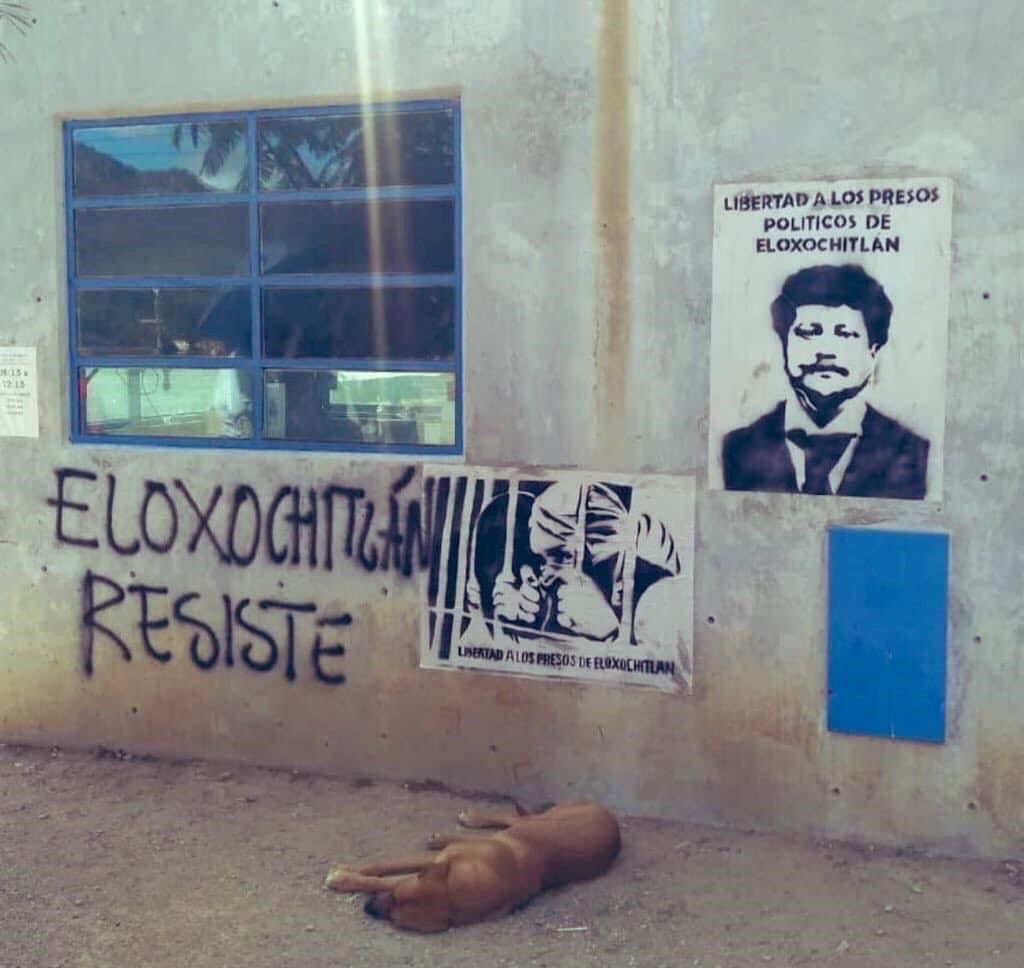
The negative effects on the community of Eloxochitlán as a consequence of the conflict and the criminalization have been extensive. “My community has lost all of its customs following what happened in December of 2014,” explains Miguel’s mother, Martha Betanzos, in a press conference. “Since 2014 our community has declined, our schools are empty, our teachers have abandoned their classes because of everything that has happened in Eloxochitlán. All the medical services have decayed. There is no longer good healthcare.”
Slow Walk Toward Freedom
Even while their legal processes have been filled with irregularities and judicial delays, the politically imprisoned and persecuted of Eloxochitlán have slowly regained their freedom, little by little, over the past ten years.
On September 29, 2023, the court in District Court in Huautla de Jiménez changed the pretrial detention orders, releasing Jaime Betanzos and Herminio Monfil, two community members from Eloxochitlán who had been in prison since December 2014 without a conviction or a sentence. They were released not in complete freedom, but to continue their legal processes on the outside.
More recently, on June 12, 2024, the tribunal in Huautla de Jiménez ordered the release of Francisco Duran, Alfredo Bolaños, and Fernando Gavito, changing their pre-trial detention orders, allowing them to continue their legal cases outside of prison form inside their communities.
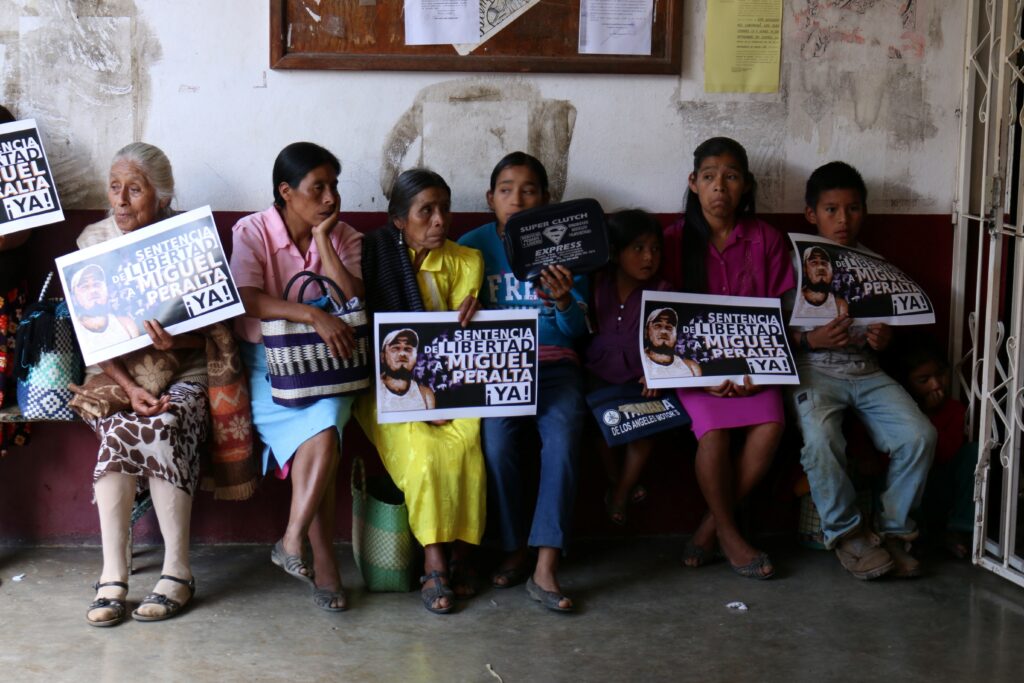
Photo: Miguel’s final hearing in the Mixed District Court of Huautla de Jiménez in 2019.
Miguel’s family and support crew hope that Miguel’s definite freedom follows these recent court victories, so that the community can continue to walk toward freedom, to continue to heal from the wounds of cacique and state repression.
“We want to live in peace, we want to be free,” says Marth Betanzos, Miguel’s mother. “We want to see Miguel Ángel Betanzos free. So that he can walk in his territory, so that he can listen to the birds, so that he can feel the mud on his feet, so that he can be amongst the mountains and coffee fields.”


